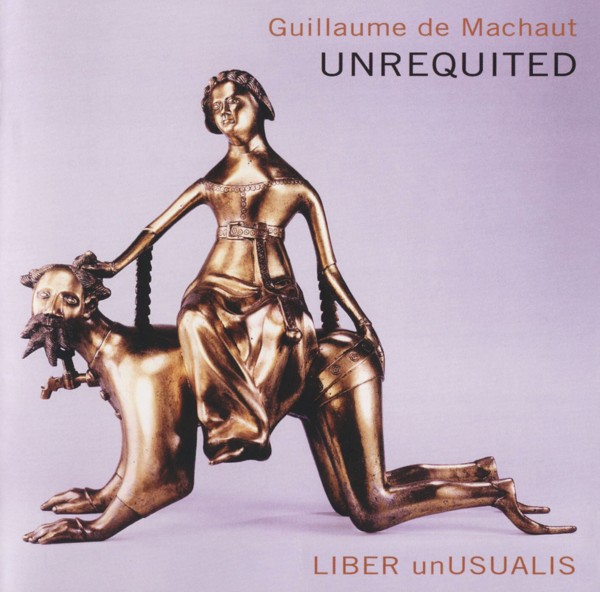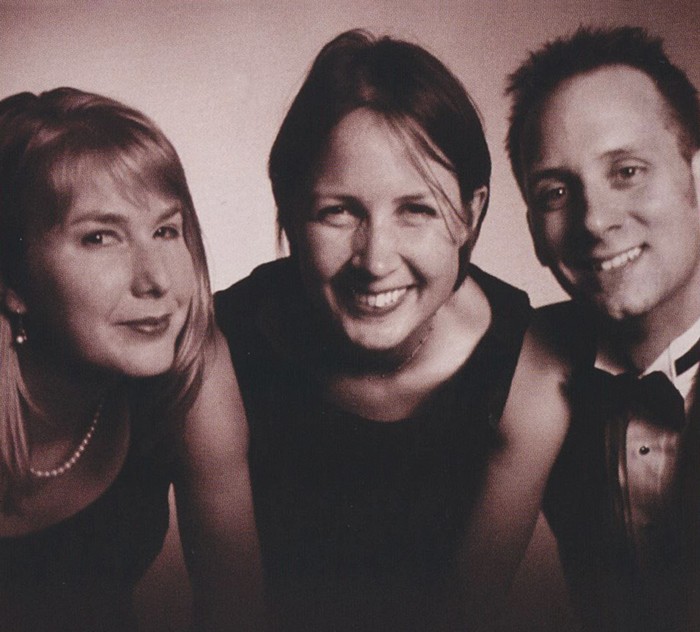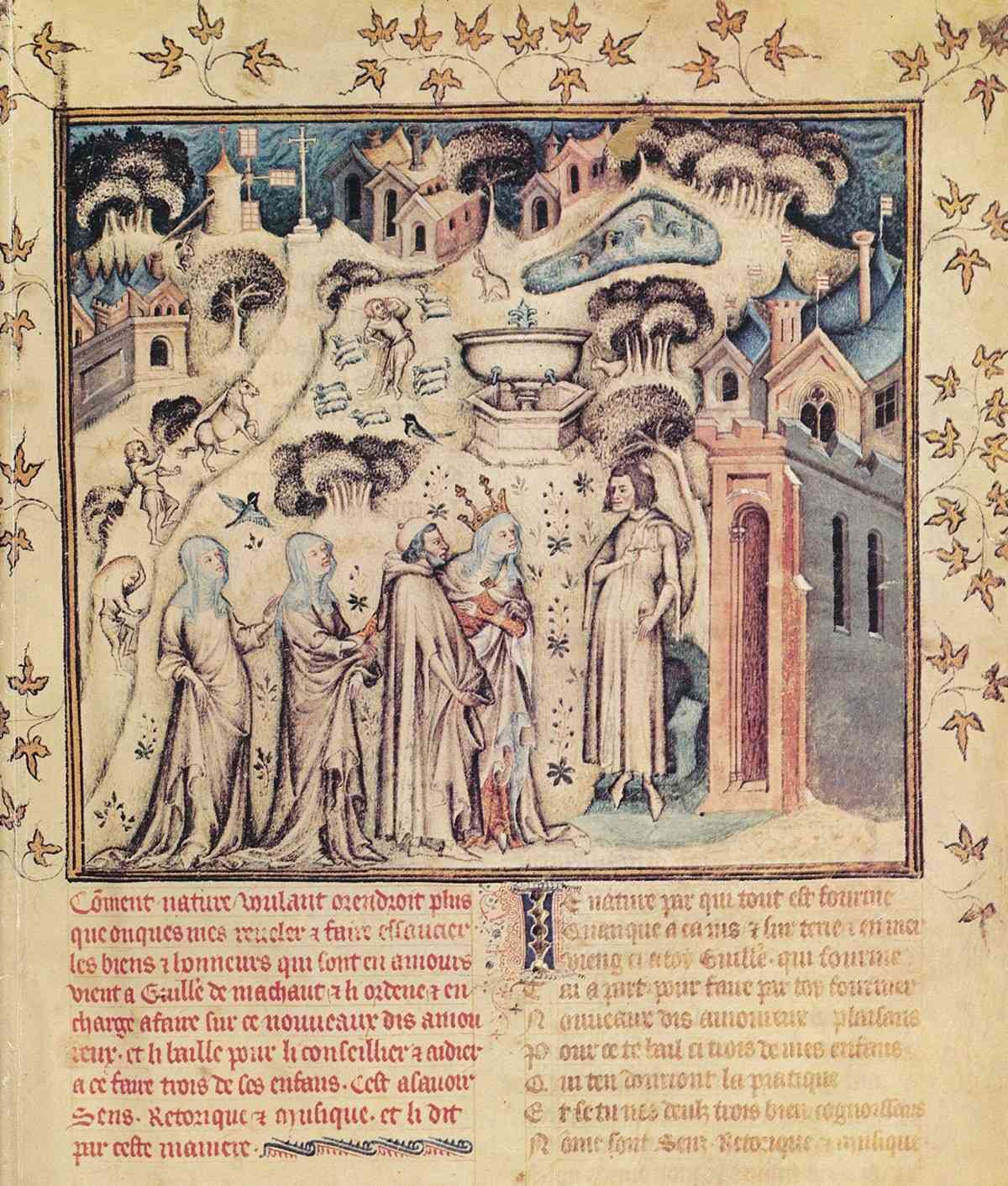Guillaume de MACHAUT. Unrequited
Liber unUsualis

medieval.org
Liber unUsualis 1001
2003
Guillaume de MACHAUT
1. Felix virgo, mater Christi ~ Inviolata genitrix ~
Ad te suspiramus gementes et flentes [3:50]
motet · soprano MG, mezzo-soprano CB, tenors WH, JS
2. Trop plus est bele que biauté ~ Biauté parée de valour ~
Je ne sui mie certeins d'avoir amie [2:28]
motet · soprano MG, mezzo-soprano CB, tenor WH
3. J'aim miex languir en ma dure dolour [5:25]
ballade · tenors WH, JS
4. Dame, ne regardes pas [7:04]
ballade · soprano MG, mezzo-soprano CB
5. Quant en moy vint premierement ~ Amour et biauté parfaite ~
Amara valde [3:40]
motet · soprano MG, mezzo-soprano CB, tenor WH
6. Donnez, signeurs, donnez à toutes mains [5:22]
ballade · mezzo-soprano CB, tenors WH, JS
7. Martyrum gemma latria ~ Diligenter inquiramus ~
A Christo honoratus [3:26]
motet · soprano MG, mezzo-soprano CB, tenor WH
8. Je ne cuit pas qu'oncques à creature [5:44]
ballade · mezzo-soprano CB, tenor WH
9. Dame, de qui toute ma joie vient [6:23]
ballade · soprano MG, mezzo-soprano CB, tenors WH, JS
10. Qui es promesses de Fortune se fie ~ Ha! Fortune trop sui mis ling de port ~
Et non est qui adjuvet [1:45]
motet · mezzo-soprano CB, tenors WH, JS
Pierre des MOLINS
11. De ce que foul pense [5:43]
ballade · soprano MG, mezzo-soprano CB, tenor WH
Franciscus ANDRIEU
12. Armes, amours, dames, chevalerie ~ O flour des flours de toute melodie [7:24]
ballade · soprano MG, mezzo-soprano CB, tenors WH, JS
LIBER unUSUALIS
Melanie Germond, soprano
Carolann Buff, mezzo-soprano
William Hudson, tenor
with
Jordan Sramek, tenor

PROGRAM NOTES
by Carolann Buff
One of the more famous images
of Guillaume de Machaut (c.1300-1377) is of the composer encountering
Nature who presents to him her children—Science, Rhetoric, and Music.
Machaut certainly utilized these gifts in all that he undertook. In his
lifetime, he produced over 100 known musical works including a complete
mass and wrote numerous poems included in some 70 different manuscripts.
Known as a great composer and poet in fourteenth-century France, his
lasting influence still ripples outward to performers and scholars
today. Machaut's existing legacy is remarkable because of his careful
attention to the smallest details of his works, the sheer volume of his
musical and literary output, his attentive supervision and organization
of his manuscripts, the quality and presentation of his music, and the
large number of musical genres in which he was fluent. Even in his own
time, Machaut was considered one of the primary influences on music
composition in the fourteenth century.
Despite being born into a
family of simple means, Machaut managed to enter the circle of his
influential and wealthy patrons. Very early in his career he was
employed by Jean of Luxembourg, King of Bohemia, and later by Jean's
daughter, Bonne. Other notable personages who patronized Machaut were
Charles II King of Navarre, Jean Duke of Berry, Philip the Bold Duke of
Burgundy, and future kings Charles V and John II of France. In addition
to employment by nobles, Machaut held several well paying benefices as
canon, as at Reims Cathedral and at the Church of St. Quentin in
Vermandois, which kept him in considerable financial stability for much
of his life. This substantial wealth and his relative fame allowed him
the luxury of time and freedom to mold carefully all of his works,
literary and musical, into art.
Machaut is best known for being
the link between the "new art" of music innovated by Philippe de Vitry
(1291-1361) and the style of composition of the later middle ages.
Vitry's compositional system is based upon the enormous range of musical
expression made possible by new notational techniques explained in his
treatise, Ars nova (c. 1322). Machaut used these notational
devices and existing poetic forms to create a new and distinct sound in
his compositions, having a lasting influence on the next two generations
of composers.
The isorhythmic motet, a musical genre based on
borrowed plainchant melodies or fragments and organized into rhythmic
and melodic groups, had steadily gained prominence as a formula since
its conception in the twelfth century. Until the 1330's, this form was a
lyric genre, often in the vernacular with multiple texts, with literary
themes such as love and fortune. Two examples are the motets Quant en moy vint premierement / Amour et biauté parfaite / Amara valde and Qui es promesses de Fortune / Ha! Fortune trop sui mis ling de port / Et non est qui adjuvet.
In the 1340's, this practice changed. The multiple texts and the Latin
tenors remained, but the texts of the upper voices became more
political, with motets dedicated to particular persons or in honor of
certain events. The motet Felix virgo, mater Christi / Inviolata genitrix / Ad te suspiramus gementes et flentes is a prayer for peace to the Virgin Mary after the siege of Reims by the English during the Hundred Years' War. Martyrum gemma latria / Diligenter inquiramus / A Christo honoratus
is a motet in honor of St. Quentin, probably written for the Collegiate
Church of St. Quentin Vermandois. One motet that serves both lyrical
and honorary functions is Trop plus est bele que biauté / Biauté parée de valour / Je ne sui mie certeins d'avoir amie.
This motet is unusual because, although it is a late period motet, the
upper voices sing vernacular texts. The tenor is also not a piece of
Latin plainchant, but probably a French song tune. In addition, the
tenor is not truly isorhythmic, but organized like a rondeau. Scholars
conjecture that the style of text setting and the rhythmic organization
of this piece reflect Machaut's mature style, circa 1350, and that the
song may have been intended as a memorial benediction to Bonne of
Luxembourg. Machaut consistently places this motet last in his
manuscripts highlighting the final "Amen" in the text.
The
ballade genre, unlike the motet, is a relatively new song form in the
fourteenth century. Machaut borrowed the form from poetry and is
credited for being a major innovator in this genre. The duet ballades
such as J'aim miex languir en ma dure dolour; Dame, ne regardes pas; and Je ne cuit pas qu'oncques creature
reflect Machaut's careful attention to the original poetic forms,
matching the text to his musical settings. Poetry and music were
irrevocably linked in all of Machaut's writings. Not only did he
conceive of the music and text as one idea, but he also segued
comfortably from narrative to poem to song. Dame, de qui toute ma joie vient from the longer literary work, Remede de Fortune,
is a song sung by the protagonist, the poet, after seeing his beloved
in a garden and being comforted by the character of Hope. One ballade, Donnez, signeurs, donnez toutes mains,
is unusual because the text's theme is more similar to honorary motets
being composed in the late fourteenth century than the common topic of
unrequited love prevalent in other ballades. This ballade, on the
subjects of largesse and the honor of nobility, may have been intended
for Jean Duke of Berry who was sent as a hostage to the English in the
terms spelled out at the Treaty of Brétigny in 1360. One ballade in this
collection is not by Machaut, although it was attributed to him in at
least one manuscript and is published in many manuscripts together with
Machaut's compositions. De ce que foul pense, by P. de Molins
(fl. mid-fourteenth century), was probably the most widely circulated
piece in fourteenth-century France and is even woven into a tapestry
called "Le Concert." Molins, like Machaut, was associated with Jean Duke
of Normandy (later King Jean II of France). His beautiful song setting
reflects how well the ballade form had influenced Machaut's
contemporaries.
Machaut's own voice is clearly heard in his music
not only because of carefully created and preserved manuscripts which
the composer himself oversaw, but also because he is certainly the
author of almost all the poems which he set to music. The texts from
Machaut's prolific output of poems present a clear image of the man, his
lusts, and his tribulations. Most notably, his words illuminate the
image of a great composer and artist. By combining poetry, song forms
and music, Machaut fully realizes the offerings Nature has given him:
the genre formulas are the presence of Science; Rhetoric is in his
poetry; and his wonderful melodies are the gifts of Music.
AIthough
there are many clues to performance in Machaut's manuscripts, so much
more abundant than any of his contemporaries, there are certain
challenges that remain for the modern performer. The issue of tuning,
especially for voices that so easily slide into just intonation, is
notable. Machaut clearly intended his music to have a certain element of
tension and release which is heightened by tuning in the Pythagorean
system. The wide major third of Pythagorean tuning leads the ear to
resolve outward to the pure fifth and the narrow minor third inward to
the unison. Another adjustment for the modern performer is the emphasis
on the linear as opposed to the vertical. What might appear as
syncopation in modern meter is really a shift by an eighth or quarter
note of a horizontal line. Performers succeed when they consider the
interaction between voices as happy coincidences of conjunction leading
to common goals. The texts, so obviously important to Machaut the poet,
must be pronounced in an older style of French vernacular or French
Latin to facilitate rhyme schemes and to add to the colors of the texts,
particularly the ballades that are simply musical poems. Finally, it is
important to resolve how to handle untexted musical lines. Scholars
still debate whether these are intended as instrumental or vocal parts,
but as Liber unUsualis is an all-vocal group and many of the pieces work
as all-vocal textures, the decision is whether to add a text or leave
the part on a single vowel. For each piece, a choice was made as to what
adds or subtracts to the text and if texting a line is even suitable or
possible.
The one piece not mentioned above is not by Machaut
but about him. In a great tribute, the poet Eustache Deschamps and the
composer F. Andrieu, both Machaut's contemporaries, prepared a double
ballade upon his death. Their tribute Armes, amours, dames, chevalerie / 0 flour des flours de toute melodie is perhaps the most eloquent and fitting description of the works and life of Machaut:
Tres doulz maistres qui tant fuestes adrois,
[O] Guillaume, mondains dieus d'armonie:
Aprés vos fais qui obtendra le choys
Sur tous fayseurs? Certes ne le congnoys.
Vo nom sera precieuse relique,
Car l'on ploura en France [et] en Artois
La mort Machaut, le noble rethouryque. |
Sweet master of skill so adept,
William, worldly god of song:
Who will win election after you
Above all artists? Surely, I do not know.
Your name shall be a precious relic, for
Men will mourn in France and Artois the
Death of Machaut, noble fashioner of song. |

ABOUT LIBER unUSUALIS
Hailed by The Boston Globe as "deeply moving," Liber unUsualis
is internationally recognized for their interpretation and performance
of medieval music, engaging audiences with inventive programming and
technical mastery of the repertoire. Since forming in 1996, they have
garnered critical acclaim both in the U.S. and abroad, as winners of the
2002 International Young Artist's Presentation—Early Music in Antwerp,
Belgium; an unprecedented "Honourable Mention" at the 1997 Early Music
Network's International Young Artists Competition (U.K.); and as
semi-finalists in the 1999 Concert Artists Guild's Competition (U.S.).
The trio has performed extensively throughout the U.S., and has
performed abroad at international music festivals in England, Wales,
Belgium, and Spain.
The members of Liber unUsualis (Melanie Germond, soprano; Carolann Buff, mezzo-soprano; and William Hudson,
tenor) each hold Master's degrees in historical performance from Longy
School of Music. This shared academic background allows the group to
unify their programs with research into both original manuscripts and
scholarly editions as well as a thorough attention to historical
context. The ensemble remains strongly committed to reaching beyond the
academic and technical aspects of performing Medieval and
early-Renaissance repertoire, continually exploring ways to express the
underlying emotion of the music. The group has presented several
workshops and lecture-demonstrations that emphasize their unique
approach to historical performance at Harvard and Tufts Universities, as
well as other academic institutions throughout the United States. Since
1999, Liber unUsualis has been Ensemble-in-Residence at the Episcopal
Cathedral Church of St. Paul, Boston where they present an annual
concert series along with performance workshops on various repertoires.
Liber
unUsualis has developed and performed a broad range of programs that
span from the earliest florid polyphony of the St. Martial repertory to
the refined harmonies of the Flemish Renaissance masters. The ensemble's
next recording project will be of their program "Forgotten Flyleaves:
Music of Medieval England," available on Passacaille in 2004.
Guest
artist Jordan Sramek studied early vocal performance at the College of
St. Scholastica in Duluth, Minnesota. Now a resident of St. Paul, he is
the Founder/Artistic Director of The Rose Ensemble and enjoys an active
freelance career as a singer, director and teacher. He was awarded a
Minnesota State Arts Board Fellowship for Performing Musicians in 2000
and received a 2002 Arts Board Career Opportunity Grant for his research
in medieval Irish chant and polyphony.
MANY THANKS TO
Simon Carrington
Mark Engelhardt
Pete Goldlust
Joel Gordon
Nina Hinson
Richard & Lois Hudson
Kathryn Karczewska
Scott Metcalfe
Michael Rogan & Hugh Wilburn
Gil & Nathalie Rose
Jordan Sramek
Catherine Stephan
Margaret Switten
and several much appreciated Anonymouses
who know who they are
|
ACKNOWLEDGMENTS
Recorded at Church of the Redeemer, Chestnut Hill, Massachusetts
on June 4-8, 2002 (#2, 4, 5, 7, 8, 11) & July 18-20, 2002 (#1, 3, 6, 9, 10, 12)
Recorded, edited and mastered by: Joel Gordon
Producers: Scott Metcalfe & Liber unUsualis
Design: Melanie Germond & Pete Goldlust
Translations: Dr. Kathryn Karczewska
Front Cover: Aquamanile: Aristotle Ridden by Phyllis, c. 1400
Southern Netherlands or Eastern France (Lorraine). Bronze
The Metropolitan Museum, New York. Robert Lehman Collection, 1975
Photos of Liber unUsualis: Liz Linder
Ⓟ & © 2003 LIBER unUSUALIS
LIBER unUSUALIS
Info@liberunusualis.com
www.liberunusualis.com |




